|
|
Concerns About Maintaining accesses of the Giuliani Era
Appearing Monday August 20, 2001 in the New York Times
By ADAM NAGOURNEY of the New York Times
TALKING POLITICS - Greenwich Village and SoHo
Richard Fitzgerald, a 49-year-old
chauffeur who lives in Greenwich
Village, was settled on a bench on a
hot and muggy morning in Washington Square Park the other day. A
police officer on a horse clip-clopped
up a path to the side. Children crowded a playground, while dog owners
ran their unleashed pets through a
fenced-in field.
And there was barely a drug dealer or homeless person in sight, an
absence that Mr. Fitzgerald, who has
been spending afternoons in the park
since he was a teenager, noted with
fresh approval and lingering astonishment.
"Oh, God, there is almost no way
to measure how much improvement
he has done," Mr. Fitzgerald said,
the unnamed "he" being the city's
soon-to-depart mayor, Rudolph W.
Giuliani. "I've lived here for 30
years, and I've hung out in this park
for 30 years, and I feel so much
better than I did 10 years ago," he
said. "This park has really turned
around. It's gotten cleaner, it's gotten safer."
In the view of advisers to the mayoral candidates, there are few neighborhoods
in New York where the
quality-of-life improvements of the
past eight years can be better measured than in the 66th Assembly District. It
is a middle-class, mostly low rise downtown patchwork that includes some of New York's
most
picturesque neighborhoods: Greenwich Village; SoHo, TriBeCa, Chelsea,
and Battery Park City among them.
Its residents voted overwhelmingly
against Mr. Giuliani when he was
first elected mayor In 1993, and then
voted to re-elect him in 1997. It was a
Democratic district settling in behind a Republican mayor, in one sign
of how politics in New York were
changed over those eight years.
These days, voters in the 66th are
pleased about the health of their City
and the vibrancy of their neighborhoods, a reflection of the sentiment
found in much of New York in a poll
taken last week by The New York
Times. They talk of tranquil parks,
anxiety-free strolls at night, a bustling local economy, cleaner streets
and a city that they seek to enjoy,
rather than escape on summer week
ends.
And while Washington Square
Park may still have its ragged edges,
many of the residents who use it say
the improvements over the past
eight years are striking.
But with three weeks to go until the
mayoral primary, there are signs of
anxiety as voters begin to consider
the imminent departure of a mayor
whose interest seemed so closely tied
to middle-class neighborhoods like
these.
"I am worried about the future,"
said Steven Man, 55, an optometrist
who is a registered Democrat. "I
don't know what will happen from
here. It could go back to,the way it
was. I'm really not sure, and that
troubles me."
And there is some concern about
whether the next mayor - who will
come from what remains, for most
people, an unfamiliar cast - will, by
choice or ability, continue the priorities that Mr. Giuliani has embraced.
"None of the guys out there are
qualified to do it; everybody out
there is scary," said Andrew Nathan,
37, the former owner of a restaurant
on Prince Street, Frontiere, which he
closed a month ago as he prepared to
move out of the city. (Mr. Nathan, a
strong Giuliani supporter and a Republican, said the timing of his own
departure had nothing to do with the
change at City Hall.)
There are more than a few people
like Marianne Salerno, 60, a medical
assistant who lives in the West Village, who said they would vote for
Mr. Giuliani again, were he not
barred from seeking reflection by
term limits. "I'm a little apprehensive," she said.
Still, this is the part of New York
where the Reform Democrat movement came alive, and that produced
Edward 1. Koch (he still lives just off
Washington Square Park), Bella S.
Abzug, and the birth of the modern
gay rights movement, at the Stone-
wall Inn on Christopher Street. Thus,
if there is something approaching an
approving consensus on some of Mr.
Giuliani's policies, the mayor him-
self is another matter: many people
do not seem unhappy that the city's
first Republican mayor in 20 years is
about to leave the stage.
"I think the city is a little bit safer
- and that's good," said Lisa Gilbert,
a writer of librettos, poetry and short
stories, who lives in the West Village.
"But I'm wondering at what cost. So
I'm going to be glad that someone
else is going to be mayor."
And if some voters are not upset at
Mr. Giuliani's departure, they are
nonetheless judging his successors
by the benchmarks that he set for his
government.
When asked the problems they
wanted the next mayor to focus on,
voters more often than not pointed to
the kind of second-tier governmental
functions that implicitly suggest an
overall satisfaction with the way
New York is delivering such basic
services as police protection and
garbage pickup.
They talked about the park system
- which Peter F. Vallone, the City
Council speaker and a Democratic
mayoral candidate, recently identified as the one governmental department he
would never cut as mayor -
or noise on the street, or municipal
recreation programs, or cleaning up
graffiti, or widening the new bicycle
path along the Hudson River....
|
|
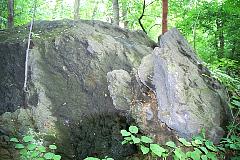 This huge boulder is only one of many. It is clear why
the original city planners didn't think this part
of Manhattan would make good farmland.
This huge boulder is only one of many. It is clear why
the original city planners didn't think this part
of Manhattan would make good farmland.
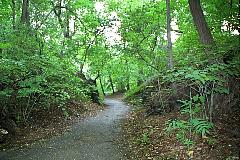 Even though this would be a good spot for a mugging, we never felt
threatened. I am including an article from the New York Times that
appeared the day after I took these pictures
[Article].
Apparently the drug
dealers and robbers have been chased out of the park.
Can you believe
this wild venue exists within one of the world's largest cities?
Even though this would be a good spot for a mugging, we never felt
threatened. I am including an article from the New York Times that
appeared the day after I took these pictures
[Article].
Apparently the drug
dealers and robbers have been chased out of the park.
Can you believe
this wild venue exists within one of the world's largest cities?
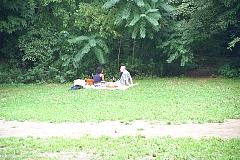 An impromptu picnic, complete with some sort of spirits. Bon Appetit!
An impromptu picnic, complete with some sort of spirits. Bon Appetit!
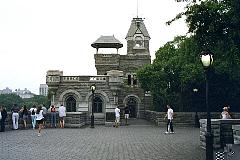 We were trying to get to the 79th Street Traverse in order to find
Belvedere Castle. Here we are. We are only travelling up to the middle
of the park. From the Castle we could see the Delacorte Theater
where Shakespeare
was going to be performed that night, some people told us by
none other than Meryl Streep. There was quite a long line.
We were trying to get to the 79th Street Traverse in order to find
Belvedere Castle. Here we are. We are only travelling up to the middle
of the park. From the Castle we could see the Delacorte Theater
where Shakespeare
was going to be performed that night, some people told us by
none other than Meryl Streep. There was quite a long line.
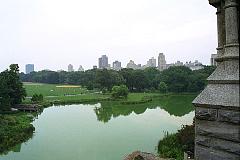 A view of Turtle Pond. The background of huge buildings presents a great contrast
of the natural and manmade worlds.
A view of Turtle Pond. The background of huge buildings presents a great contrast
of the natural and manmade worlds.
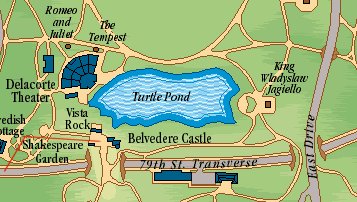 Here is our location on the map.
Here is our location on the map.
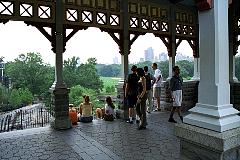 View from within Belvedere Castle.
View from within Belvedere Castle.
 Shakespeare Garden is right next door to Belvedere. Pardon me while I try out
my camera.
Shakespeare Garden is right next door to Belvedere. Pardon me while I try out
my camera.